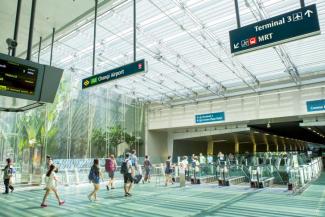
Singapore, 26 September 2018 (Wednesday) – The Institute of Service Excellence (ISE) (卓越服务研究院)at Singapore Management University (SMU) today released the 2018 second quarter (Q2) Customer Satisfaction Index of Singapore (CSISG) results for the Air Transport and Land Transport sectors.
In the latest results, the Air Transport sector, scored 75.4 points on a 0 to 100 scale. This was a 1.4% improvement over last year. On the other hand, the Land Transport sector scored 67.8 points, unchanged from the previous year.
Air Transport
The Air Transport sector comprises of three sub-sectors, namely, the Airport, Budget Airlines, and Full Service Airlines. While the Airport and Full Service Airlines sub-sectors performed similarly to last year, scoring 78.0 points and 74.5 points respectively, the Budget Airlines sub-sector improved, scoring 73.1 points, a 2.7% increase year-on-year.
With this latest set of CSISG 2018 results, the Budget Airlines sub-sector recorded its third consecutive annual increase in customer satisfaction. Compared to Full Service Airlines, which saw relatively more modest improvements in scores, the difference in satisfaction levels between the two sub-sectors has been narrowing: in 2014, the difference was 7.2%, this year, the difference has narrowed to just 1.9%.
Furthermore, for the first time in five years, Budget Airline customers’ rating for “Likelihood to Repurchase”, i.e., their propensity to fly with the airline again, surpassed that of Full Service Airline customers.
“The performance metrics of Budget Airlines have been converging on Full Service Airlines for a few years now,” noted Ms Neeta Lachmandas (妮塔.拉切曼达斯), Executive Director (执行总监) of ISE.
“This suggest Budget Airlines, beyond using price as a lever, have been successful in shaping what travellers deem to be a high-quality mode for air travel.”
Land Transport
The Land Transport sector is made up of four sub-sectors, namely Mass Rapid Transit (MRT) System, Public Buses, Taxi Services, and Transport Booking Apps. The Public Buses and Taxi Services sub-sectors recorded higher CSISG scores year-on-year, at 65.6 points and 72.5 points, respectively. The MRT and Transport Booking Apps sub-sectors recorded lower scores year-on-year, at 63.6 points and 68.0 points, respectively. However, these changes were not statistically significant.
Notably, this is the first time since CSISG tracking began in 2007 that customer satisfaction with Public Buses outperformed the MRT system with statistical significance.
“The significant investments into the public bus system, such as the Bus Service Enhancement Programme, have seen the sub-sector record four consecutive years of improvement,” remarked Ms Lachmandas.
Analysing the Public Buses and MRT sub-sectors more closely, it was observed that satisfaction, user trust, and confidence with the public transport operators were closely linked to commuters’ satisfaction with government intervention in these public transport systems.
For instance, MRT sub-sector respondents had an average CSISG score of 67.0 points when they indicated they were satisfied with government intervention with the public train system. Conversely, MRT sub-sector respondents had a score of just 30.0 points when they indicated they were not satisfied with the level of government intervention.
Mr Chen Yongchang (陈勇畅), Head of Research and Consulting at ISE, said “Improvement in several customer satisfaction metrics for our public bus and MRT systems seem to be tied to public perceptions of government intervention. Therefore, to most efficiently move the needle, our public transport operators should consider working closely with government regulators.”
Analysis of the Transport Booking Apps sub-sector also revealed a noteworthy observation. While the CSISG performance was similar year-on-year, two attributes, ‘Fares charged’ and ‘Attractiveness of app promotions and discounts’, recorded significantly lower satisfaction with customers, falling 7.7% and 17.1%, respectively.
“The consolidation of Transport Booking Apps and the larger private hire car industry over the past year has resulted in a measurable decrease in these two attributes, as well as predicted and perceived quality. Transport Booking Apps should consider how they can better manage these issues,” commented Mr Chen.
The CSISG 2018 Q2 study was conducted between April and July 2018. A total of 6,249 respondents, comprising of 3,539 locals and 2,710 tourists, were surveyed.
Please refer to Annex A for a background on the CSISG and Annex B for the detailed scores.
*********
For media queries, please contact:
Mr Tim Zhuang
Senior Manager, Partnerships and Programme Development
Institute of Service Excellence (ISE) at Singapore Management University
DID: (65) 6808 5258
Mobile: (65) 9748 9389
Email: timzhuang [at] smu.edu.sg (timzhuang[at]smu[dot]edu[dot]sg)
Mr Teo Chang Ching
Senior Assistant Director, Corporate Communications
Office of Corporate Communications and Marketing
DID: (65) 6828 0451
Mobile: (65) 9431 8353
Email: ccteo [at] smu.edu.sg (ccteo[at]smu[dot]edu[dot]sg)